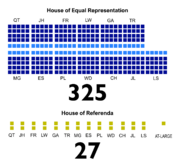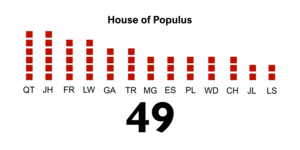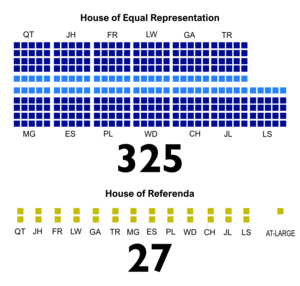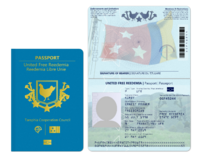Government of Freedemia
This page is about the government and politics of Freedemia.
 See also: Freedemia
See also: Freedemia
| Government of Free Reedemia | |
|---|---|
| Constitutional Presidential Republic | |
| Capital | Quentinsburgh |
| Head of state | |
| • President | Angela Rosenthal |
| • Vice President | Patrick Houser |
| • Executive Whip & Vice Executive Whip | Katherine Nelzer, Lily Mae Clarington |
| Legislature | National Legislature |
| • Upper house | House of Populus |
| • Lower house | House of Equal Representation House of Referenda |
| Judiciary | National Court |
Major political parties | |
No official political parties. Main ideological factions: Center-Left Authoritarians Left Soc Libertarians Conservative Protectionists Far-Right Nationalists | |
| TCC, Ingerish Commonwealth, AN | |
The National Government of Free Reedemia usually referred to as the Federal or National Government, is the highest level of government created by the constitution as the legislative, executive and judicial authority over Freedemia's thirteen states and all municipalities and counties therein. The seat of the government is located in Quentinsburgh, Quentins.
National Government
Freedemia is a federation, and as such the National Government is the strongest government level with the power to overrule states and municipalities within constitutional limits. The National Government consists of three primary branches (executive, legislative, and judiciary), as well as a separate bureaucracy to handle things such as ethics complaints. This system was made to have a degree of checks and balances, so that no individual branch would have too much concentrated power. The current setup of the National Government was adopted in 1898 as part of the 1898 Constitution.
Executive
The executive branch is headed by the President and Vice President and includes an administration of various advisory positions. The president has the power to veto laws sent to them, though the legislature can override. They are also generally seen as the head of state. Unlike most other countries with a presidential system, the runner up candidate and running mate of each presidential election become Executive Whip and Vice Executive Whip, positions within the administration where they play an advisory role to the president and try to work with them on certain ideas. The Executive Whip is also the 3rd in line for the presidency behind the Vice President, with the Vice Executive Whip 4th in line. The idea behind the Executive Whips is to ensure that candidates with reasonably different ideas are made to work together on a solution that's more problem-solution focused than strictly partisan or ideological, and that candidates coming from different perspectives can help ensure that problems the President and Vice President may not see are brought to light.
Legislature
Freedemia's legislature is tricameral, consisting of the House of Poplators, an upper house where representatives are based on population, the House of Equal Representation, a lower house where each state gets an equal number, and the House of Referenda, which decides whether legislative-introduced bills need to be approved by the public by referendum to become law and oversee referendas initiated by the public. The legislature makes federal laws, and has the ability to override a presidential veto with enough support. The legislature is located in the old Parliament Building at the western end of the Capitol Mall in Quentinsburgh.
House of Populus
The House of Populus is Freedemia's upper house, where Poplators are elected at large from each state based on the population of the state. While the number of Poplators each state gets is based on state population, they are not proportional to the actual population number- states have set amounts of Poplators that can be amended to accommodate major changes in population, though this has not been triggered since the establishment of the modern national government under the 1898 Constitution. Together with the House of Equal Representation, the House of Populus introduces bills, debates and amends them, and votes whether to pass them and send them to the president. Both the House of Populus and House of Equal Representatives have to vote to pass a bill for it to be sent to the president to become law.
House of Equal Representation
The House of Equal Representation is Freedemia's primary lower house, meant to represent each state internally. Each state gets 25 representatives, for a total of 325. 20 representatives are elected by district, while 5 representatives are elected statewide. The House of Equal Representation, like the House of Populus, introduces bills, debates and amends them, and votes whether to pass them and send to the president if voted for in both main houses.
House of Referenda
The House of Referenda serves two primary purposes. It decides whether bills introduced in the legislature need to be voted on by the public to become law, as well as oversees referenda initiated by the public, either getting them to ballot or voting them down. While considered a "lower house", because of its unique function the House of Referenda is somewhat independent of the other two houses of the legislature. It is also not involved in the normal bill passing process other than to decide whether something needs to be voted on by the public. Each state gets 2 Referenda Councilmen, and one tiebreaker Referenda Councilman is elected at large nationally, for a total of 27. The election for the at-large Referenda Councilman is often one of the biggest national elections alongside president/executive whip.
Judiciary
Freedemia's judiciary, known as the National Court, handles major cases that involve constitutional rights as well as appeals that reach the highest level of the court system. The National Court is located in the old Royal Palace within the Capitol Mall in Quentinsburgh across from the Executive Residence.
State Governments
Municipal Governments
Poltical Party Ban
Freedemia, unlike many democracies, lacks a political party system, with a constitutional amendment banning parties from the political system since the early 1960s. This was largely put in place to avoid party line votes and to encourage voters and legislators to look at each candidate and policy individually. This policy has been criticized by some as rewarding name recognition and reinforcing power structures, but applauded by others for a reduction in partisanship and attraction of a diversity of individualized candidate platforms.
Politics
Major Ideological Factions
As Freedemia lacks a party system, there tends to be a bit more variety in political beliefs represented. However, there are still some main political factions that have formed. Freedemia's politics are currently dominated by center-left authoritarianism, mostly exemplified by support for publicly run government programs along with support for existing bans on things like alcohol sales and drug use. However, left social libertarianism has seen a significant rise in recent years, with more support for legalization of things like sex work and alcohol, pushes for further deregulation and public-private partnerships, and a greater focus on liberty. Both groups have a global focus, supporting regional collaboration efforts like the Tarephia Cooperation Council alongside domestic security. In contrast, conservative protectionism is very focused on domestic safety and economy over all else, with the belief that regional cooperation has done more to hurt Freedemia than help and that global connections have put the country at greater risk of conflict. Conservative protectionists are the minority, but have strong support in areas that lost the most jobs to outsourcing like Lawrence and Lenseter.
Major Political Issues
Split over Alliances, Trade, and the Open Economy
Moves like joining the TCC and taking a liberal approach on trade and immigration beginning in the ~1970s made a large impact on Freedemia's rise. The new approach helped Freedemian businesses in tech, fast food, retail, and other major sectors expand and succeed internationally, attracted the best from around the world to its universities and technology/engineering firms, and allowed tourism and entertainment to flourish. These in turn directly helped most cities like Quentinsburgh, Frankelyn, Vandoveur, and Jhuandan thrive and grow. In addition, new direct rail ferry trade routes from Cabelia and Aerágny to the Vandoveur shore helped Frankelyn and Vandoveur thrive as trade-centered port cities on top of their already growing entertainment industry.
However, in contrast, increased trade and patronage of goods and industry from other TCC nations like Aerágny, Paroy, and Tigeria directly hurt Freedemian heavy industry, as other nations, especially Aerágny, had the edge on manufacturing ability and cost. Lawrence and Lenseter, home to much of said industry, were hit extremely hard and went into a state of stagnation and decline. Many industry jobs have actually returned in recent years in the form of Cabelia-owned companies opening factories in cities like Lawrence. However, for some conservatives with the strongest "Freedemia First" beliefs, losing ownership of the factories was still a major loss even when the jobs were retained.
This has led to a major political split within Freedemia, where most of the country is strongly in favor of globalization and an open economy but the Lawrence-Lenseter metro is fiercely in opposition. Lawrence State is known to strongly favor protectionism and to vote heavily against globalization/free trade/TCC alliances and those that support it, while metros like Quentinsburgh, Frankelyn/Vandoveur, and Jhuandan that thrive on it overwhelmingly outvote them.
Neglect and Exploitation of Northern Interior
In many ways the natural resource exploitation of the northern interior is part of what allows Freedemia to function as a somewhat wealthy regional power, but the region's low population leaves its residents with little voting power, and many of the area's unique issues are largely taken for granted or ignored by the populated and wealthier coastal population.
The rural areas of the northern interior are home to the highest levels of poverty in the nation, with most living conditions ranging from rundown mining towns full of trailer parks to villages of tiny shed homes with unreliable electricity, outhouses and water basins. Fotja Rejt, the largest city in the interior, has slightly better conditions, but is still one of the poorest cities in the nation. The region also sees heavy environmental exploitation, as the location where most of Freedemia's natural/mineral resources are mined. These dirty industries tend to be the largest employers in the north and are notorious for terrible working conditions and insufficient protections for employees and for those living in the area. Pollution and contamination of towns and villages throughout the Northern Interior is common, and the region has the highest rates of cancer and other health issues in the country.
The northern interior also has the highest concentration of Native Tarephian population, partially due to many natives having moved inland during the colonial era to flee the encroachment of the colonies along the coast. In contrast to most other parts of the country where assimilation and erasure of native cultures was emphasized, Budrian culture and language are still strong in the communities of the northern interior.
Many theorize that subconscious racism and prejudice against non-assimilated native Tarephians is the true reason for the geographical neglect and heavy exploitation, similar to deliberate disinvestment in areas de-facto segregated in other nations. However, this is often difficult to prove due to the population and geography factors. The northern interior has by far the lowest and least concentrated population in the nation and a difficult mountainous jungle-filled terrain. Because of this provision of services and infrastructure to the most isolated communities is difficult, and many leaders from the higher populated coasts claim that the investments being asked for are not financially feasible for such a large area with such low population density.
National Stability and Avoiding War as Number One Priority
It's been said that the easiest way to get Freedemians to turn on an ally is to make them fear that their partnership puts them at risk of war. This tends to stand true.
Outside of regions like Lawrence state that have been hit hard by regional competition, support for involvement in the TCC, open trade alliances, and other various global partnerships tends to be fairly high across the board. That support, however, though strong, is extremely fragile. For most Freedemians, regardless of what other beliefs they hold or what stances they have on controversial issues, the number one priority is domestic stability and avoiding war/international conflict. While it hasn't come to be in recent decades, polling has consistently shown that the overwhelming majority of Freedemians would swing heavily in favor of isolationism and disengaging from regional partners in the name of national security and peace.
In many ways, it is the prolonged peace itself that Freedemia has experienced that has allowed the pro-cooperation culture and attitude to thrive in Freedemian government and society. While initially met with skepticism in the 60s and 70s, the idea that a country could have close international relationships and lasting peace/good relations simultaneously is somewhat taken for granted in Freedemian society today. However, polling shows risk of war is the one area where fearmongering is very effective on Freedemians. Unlike concerns of loss of industry or changes in culture, Freedemians tend to be legitimately horrified of the risk of being drawn into international conflicts, and such fears have at times been exploited to rile up a very strong protectionist "Freedemia First" anti-collaboration sentiment among much of the population.
Debates Over Strict Approaches to Alcohol, Smoking, Drugs
Freedemia has fairly strict laws banning the sale of alcohol or tobacco products within the country, as well as public intoxication and public smoking. While possession itself and even private use of alcohol or tobacco products are not illegal, any form of sales or public use is fully prohibited. Freedemians generally cite the damage both can have on others (drunk individuals being more of a risk for drunk driving, domestic violence, etc; secondhand smoke causing damage to bystanders and others) as justification.
Rather than being punished with jail time, there has been an attempt in the past decades to turn sentencing towards rehabilitation. Public intoxication, possession of hard drugs, and crimes (especially domestic violence) committed under the influence of alcohol or drugs come with mandatory rehab sentencing. In addition, voluntary rehab is offered at no risk to those who come forward if they have not committed a crime by these standards.
In recent years, there have been debates over whether this approach is too harsh, with some critics advocating for a more libertarian approach, especially to alcohol. Many cite several other countries where alcohol use is fully legal that don't see rampant drinking-related offenses, as well as have a strong economic benefit from breweries and alcohol-serving restaurants and groups. Some also argue that the banning of safe regulated alcohol has led to many turning to even more dangerous moonshines or to mouthwashes and other products with alcohol content. While similar arguments have been made for smoking and drugs, the understanding of the effects of secondhand smoke and some of the more direct effects of hard drugs have prevented them from gaining any traction. In contrast, the debate on alcohol has continued to grow, though the vast majority still currently support the ban.
As it stands currently, Freedemia has a thriving and somewhat unrivaled mocktail industry, with nonalcoholic mocktail bars and pubs thriving in the place of their alcoholic counterparts (partially because of a lack of competition from them). The industry has seemed split on proposals for less strict alcohol policies, with some wanting to be able to expand offerings and others fearing competition. Some pro-alcohol-policy-reform groups have claimed "Big Mocktail" has lobbied to keep alcohol illegal to help their own industry.
The current leading proposal by pro-legalization groups is to legalize but with strict limits on amount purchased at any one establishment and limits on alcohol content in all sold alcohol.
Foreign Relations
Free Reedemia has an established structure of foreign relations. While historically it had been somewhat isolationist out of pacifist tendencies and fear of war, today Freedemia is known for its regional and internartional collaboration. Freedemia is a founding member of the Tarephia Cooperation Council, allowing free trade and visa-free travel to member nations. Freedemia is also a less active member of the Ingerish Commonwealth and a member of the Assembly of Nations.
Freedemia has especially close partnerships with several neighboring countries in Tarephia and Antarephia, including Paroy, Aerágny, Cabelia, Geare, and Mandatory Meilan. Countries such as Vodeo, Allendea, and Barzona are also close regional partners, and Freedemia has strong relationships with most other Ingerish colonies such as New Ingerland and the Federal States. Freedemia also has many close partners across other continents.
Freedemia is generally understood to aim for diplomacy and mutual understanding with most countries, even those it is not very closely allied with. While relations with countries like Bai, Suria, and Demirhan Devleti sometimes see tensions, collaboration still occurs frequently, and the only countries Freedemia currently does not recognize relations with at this point in time are Antigo and Kuehong, both over human rights violations and militarism.
Partially due to the good relationship Freedemia has with most countries in addition to membership in the Tarephia Cooperation Council and Ingerish Commonwealth, Freedemia has one of the strongest passports in the world.
Strategic Internationalism
Due to the strategic position along the Strait of Lyc, Freedemia is theoretically a ripe target for attack. As such, Freedemia has a fairly large and strong defense-oriented military, but does not use it as an exploratory military.
The typical foreign policy stance is that Freedemia would only go to war when attacked or at very imminent threat of being attacked, and as an anti-interventionalist nation, never to initiate an attack. However, Freedemia will fight back whenever and wherever it is attacked. Freedemia does not attempt complete neutrality, and it will generally assist nations it aligns with using internationalist methods- monetary assistance, diplomatic assistance, and in select cases weapons and assistance. However, it will almost never take militaristic action against another country or in favor of another nation unless put directly at risk. One major exception is Geare, as Freedemia has an agreement with Geare to provide defense services.




